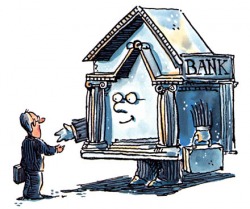Banking Basics
Understanding how banks operate is essential in laying the foundation for your financial future. In this module you will:
- Learn how to open a bank account
- Understand the services of a bank
- Learn how to set up a personal budget
Part 1: Opening a bank account

With everything that is happening on Wall Street, it is difficult to know who you can trust. So how do you decide which bank to choose? I recommend that you go with a credit union. You should understand the difference between a bank and a credit union. Credit Unions typically have lower fees and better interest rates. They also score higher on customer satisfaction surveys.
To become a member of a credit union you usually need to belong through some affiliation. You may be eligible to join based on your workplace, your church, or other organizations that you belong to. Just about everyone can join a credit union through some affiliation. You can locate a credit union that you are eligible for by clicking here.
To become a member of a credit union you usually need to belong through some affiliation. You may be eligible to join based on your workplace, your church, or other organizations that you belong to. Just about everyone can join a credit union through some affiliation. You can locate a credit union that you are eligible for by clicking here.
Part 2: Understanding Bank Services

Once you have chosen your bank, it is wise to go into a bank to open an account. Some banks may offer the opportunity to sign up for an account, but it is easier for beginners to ask questions and establish a relationship through face to face contact. It is recommended that at the very least you open a checking account and a savings account. We will also take a look at debit and credit cards.
- Checking Account: A checking account allows you to easily put money in and take money out of your account by writing checks or using a debit card. Although some banks may want to change you monthly fees to open accounts, most good credit unions will offer checking services for free. If the bank or credit union you choose does not offer these services than we suggest you look elsewhere. Be aware of hidden fees such as a minimum balance fee or inactivity fee. Ask the banker about these fees and be sure that they will not come back to haunt you later on.
- Savings Account: A savings account should also be a free service provided by the banks. This type of account usually earns you interest on your money. That's right, the bank will pay you to deposit money. The more you deposit, the more you will make. When shopping for a savings account you should look for higher interest rates. It may seem like a small amount but in the long run it can lead to a lot of money.
- Debit/Credit Card: In addition to a checking and savings account, you should also see if a debit or credit card is right for you. You can use both debit and credit cards to pay for goods and services. The biggest difference between the two is that debit cards withdraw money directly from your checking account. With credit cards you are borrowing money from the bank and promising to pay it back later. We recommend that everyone gets a debit card. They are a free and convenient way to spend money. We also recommend that most people get a credit card as well. Credit Unions typically offer some of the best credit cards. See our module on credit to see if one is right for you.
Part 3 - Protecting Yourself

If you are new to banking there are a few things you should know about in order to stay protected. One growing problem with the proliferation of online banking is identity theft. Another major concern is overdraft fees. There are a few easy steps that you can take to avoid these common problems associated with banks.
- Protecting yourself from identity theft - Balancetrack financial suggests taking the following steps in order to prevent identity theft.
- Only carry with you what you need. If you are not going to use your debit card or checks, leave them in a safe place at home.
- Never carry your PIN with you or write it on your debit card. Do not share your pin number with anyone.
- Report a lost or stolen check or debit card to your financial institution immediately. If unauthorized charges were made, the maximum amount you can be held liable for under the federal Electronic Fund Transfer Act is dependent on how quickly you report it: $50 if reported within two business days, $500 if reported within 60 days but more than two days, and unlimited liability if you wait more than 60 days.
- Never disclose your account or debit card number over the phone or on-line unless you know you're dealing with a reputable company.
- Cut up or shred old debit cards and statements before disposing of them.
- Avoiding Overdraft fees - Many people worry that they will not be able to keep track of how much money they have left in their checking account. If you write a check or use your debit card and there is not enough money in your account to cover it, the bank may charge you a fee of $20 - $50. The following tips provided by balancetrack will help you balance your checkbook:
- Subtract from your statement balance any checks you wrote that are still outstanding.
- Add to your statement balance any checks that were deposited that have not yet cleared.
- If not already done so, add to your records balance any automatic deposits and subtract any automatic withdrawals.
- Add to your records balance any interest earned on your checking account.
- Subtract from your records balance any legitimately charged fees, such as a monthly maintenance or NSF fee. (If you believed that a fee was charged in error, report it to the financial institution.)
Checking for Understanding

The banking basics quiz can be found on the teacher resource page.
Your assignment for this module is to compare two different banks using the bank account comparison worksheet. After comparing the banks you will decide which would be a better option. After completing both sides of the sheet write a paragraph that provides at least three reasons why you chose the bank that you did. It must show a basic understanding of bank functions and fees.
The rubric used to grade can be seen by clicking here and it can be seen on the teacher resource page.
Your assignment for this module is to compare two different banks using the bank account comparison worksheet. After comparing the banks you will decide which would be a better option. After completing both sides of the sheet write a paragraph that provides at least three reasons why you chose the bank that you did. It must show a basic understanding of bank functions and fees.
The rubric used to grade can be seen by clicking here and it can be seen on the teacher resource page.
